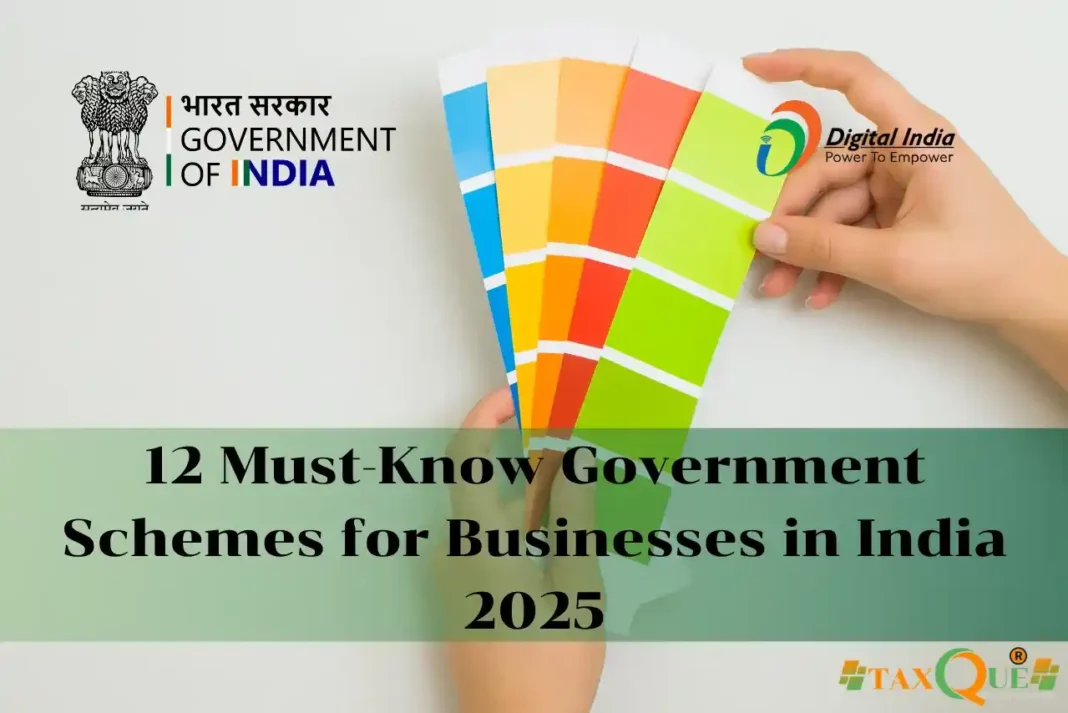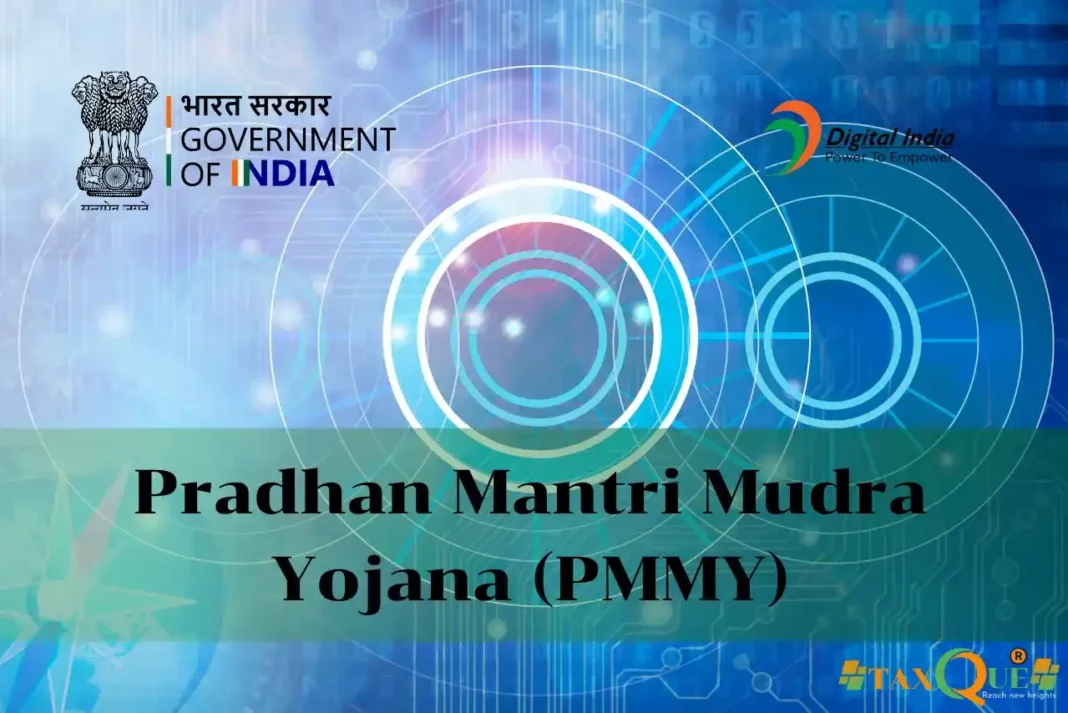Introduction
Are you a small business owner or a startup founder looking for funding in 2025? The Indian government offers a range of government schemes for businesses in India 2025 to help you grow. From loans to grants, these schemes support MSMEs, startups, and entrepreneurs across sectors. In this blog, we’ll explore 12 active schemes, their benefits, and how TaxQue’s compliance services can help you access them.
Why Government Schemes Matter for Your Business
Government schemes provide financial and regulatory support, making it easier to start or scale your business. With the Union Budget 2025-26 introducing new initiatives, these programs are more relevant than ever. They offer collateral-free loans, subsidies, and incubation support, helping businesses thrive in a competitive market.
1. Pradhan Mantri Mudra Yojana (PMMY)
PMMY is a flagship scheme offering collateral-free loans up to ₹20 lakh for micro and small enterprises. The 2025 budget increased the Tarun category limit to ₹20 lakh for repeat borrowers, making it a top choice for MSMEs.
- Eligibility: Non-corporate businesses in manufacturing, trading, or services.
- Benefits: Loans in Shishu (up to ₹50,000), Kishor (₹50,001–₹5 lakh), and Tarun (₹5 lakh–₹20 lakh) categories.
- How to Apply: Register on the Udyam portal and approach banks or NBFCs.
Read more
2. Startup India Seed Fund Scheme (SISFS)
SISFS supports early-stage startups with grants up to ₹20 lakh for proof-of-concept and market entry. It’s perfect for tech-driven entrepreneurs aiming to scale.
- Eligibility: DPIIT-recognized startups with 51% Indian equity.
- Benefits: Grants for product development and mentorship.
- How to Apply: Apply through the Startup India portal.
Read more
3. Stand Up India
This scheme promotes inclusivity by offering loans between ₹10 lakh and ₹1 crore to SC/ST and women entrepreneurs for greenfield projects.
- Eligibility: SC/ST or women starting new ventures.
- Benefits: Loans for manufacturing, services, or trading units.
- How to Apply: Contact participating banks with a business plan.
Read more
4. Prime Minister’s Employment Generation Programme (PMEGP)
PMEGP provides financing to set up micro-enterprises, creating self-employment opportunities across rural and urban areas.
- Eligibility: New or existing micro-enterprises.
- Benefits: Subsidies up to 35% in rural areas and 25% in urban areas.
- How to Apply: Submit applications via the KVIC portal.
Read more
5. Credit Guarantee Fund Scheme for Micro and Small Enterprises (CGTMSE)
CGTMSE offers collateral-free loans up to ₹2 crore, reducing lender risk and easing credit access for MSMEs.
- Eligibility: Small businesses registered as MSMEs.
- Benefits: Guarantee cover up to 85% of loan amount.
- How to Apply: Approach banks or financial institutions.
Read more
6. Credit-Linked Capital Subsidy Scheme (CLCSS)
CLCSS subsidizes technology upgrades for MSMEs, boosting efficiency in manufacturing and supply chains.
- Eligibility: MSMEs in manufacturing or marketing.
- Benefits: Up to 15% subsidy on capital investment.
- How to Apply: Apply through SIDBI or nodal banks.
Read more
7. SIDBI Loans
The Small Industries Development Bank of India (SIDBI) provides direct and indirect loans to MSMEs for growth and expansion.
- Eligibility: Registered MSMEs.
- Benefits: Loans up to ₹1 crore without collateral.
- How to Apply: Contact SIDBI or partner banks.
Read more
8. Atal Innovation Mission (AIM)
AIM fosters innovation by supporting startups through incubation centers and funding, especially in tech and agro-industries.
- Eligibility: Startups and innovators.
- Benefits: Access to incubators and grants.
- How to Apply: Register on the AIM portal.
Read more
9. Make in India
Make in India promotes manufacturing and local businesses, with MSME-focused initiatives under Atmanirbhar Bharat.
- Eligibility: Manufacturing units.
- Benefits: Policy support and market access.
- How to Apply: Register as an MSME and align with scheme guidelines.
Read more
10. Rashtriya Krishi Vikas Yojana (RKVY) – RAFTAAR
RKVY-RAFTAAR supports agripreneurship with financial aid and incubation for agricultural startups.
- Eligibility: Agripreneurs and agribusinesses.
- Benefits: Grants and mentorship for agro-innovation.
- How to Apply: Apply through state nodal agencies.
Read more
11. Customisable Credit Card for Micro Enterprises
A new 2025-26 Budget initiative, this scheme offers a ₹5 lakh credit card for Udyam-registered micro enterprises.
- Eligibility: Micro enterprises with Udyam registration.
- Benefits: Flexible credit for working capital.
- How to Apply: Register on the Udyam portal and contact banks.
Read more
12. Support for First-Time Entrepreneurs
This 2025-26 Budget scheme provides loans up to ₹2 crore for 5 lakh first-time women, SC, and ST entrepreneurs over five years.
- Eligibility: First-time women, SC, or ST entrepreneurs.
- Benefits: Loans and online training.
- How to Apply: Apply through designated banks.
Read more
Comparison Table of Government Schemes
| Scheme Name | Focus Area | Eligibility | Key Benefit |
|---|---|---|---|
| PMMY | Micro/small enterprises | Non-corporate businesses | Loans up to ₹20 lakh, no collateral |
| SISFS | Startups | DPIIT-recognized startups | Grants up to ₹20 lakh |
| Stand Up India | SC/ST, women entrepreneurs | SC/ST, women for greenfield projects | Loans ₹10 lakh–₹1 crore |
| PMEGP | Micro-enterprises | New/existing micro-enterprises | Subsidies up to 35% |
| CGTMSE | MSMEs | Small businesses | Collateral-free loans up to ₹2 crore |
| CLCSS | Technology upgrades | MSMEs in manufacturing | 15% subsidy on capital investment |
| SIDBI Loans | MSME growth | Registered MSMEs | Loans up to ₹1 crore |
| AIM | Innovation | Startups, innovators | Incubation and grants |
| Make in India | Manufacturing | Manufacturing units | Policy and market support |
| RKVY-RAFTAAR | Agripreneurship | Agripreneurs | Grants for agro-innovation |
| Customisable Credit Card | Micro enterprises | Udyam-registered micro enterprises | ₹5 lakh credit card |
| Support for First-Time Entrepreneurs | Women, SC/ST entrepreneurs | First-time entrepreneurs | Loans up to ₹2 crore |
How TaxQue Can Help You Access These Schemes
Navigating government schemes for businesses in India 2025 requires proper documentation and compliance. TaxQue offers expert services like Udyam registration, GST compliance, and company incorporation to simplify the process. Whether you need a business plan for PMMY or DPIIT recognition for SISFS, TaxQue ensures you meet all requirements, boosting your chances of approval.
FAQs
- What are the top government schemes for businesses in India 2025?
Top schemes include PMMY, SISFS, Stand Up India, and the new Customisable Credit Card, offering loans and grants for MSMEs and startups. - Who is eligible for the Customisable Credit Card scheme?
Micro enterprises registered on the Udyam portal can apply for this ₹5 lakh credit card introduced in the 2025-26 Budget. - How can I apply for PMMY loans in 2025?
Register on the Udyam portal, prepare a business plan, and approach banks or NBFCs with KYC and project details. - What support does Startup India offer startups?
SISFS provides grants up to ₹20 lakh, while Startup India offers tax benefits, mentorship, and DPIIT recognition. - How does TaxQue assist with these schemes?
TaxQue provides Udyam registration, GST compliance, and documentation support to help you qualify for schemes like PMMY and CGTMSE.
Conclusion
The government schemes for businesses in India 2025 offer incredible opportunities for MSMEs, startups, and entrepreneurs. From PMMY’s ₹20 lakh loans to the new ₹5 lakh credit card, these initiatives can fuel your business growth. Partner with TaxQue to handle compliance and documentation, ensuring you access these schemes effortlessly. Ready to grow? Contact TaxQue today!





